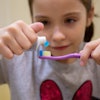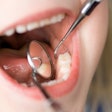Women with low levels of vitamin D during pregnancy are linked to a higher risk of caries in the teeth of their babies, according to a new study in Pediatrics (April 21, 2014).
Canadian researchers found that the calcification levels of children's teeth can be affected if their mothers had inadequate vitamin D levels when pregnant. This also increased the risk of enamel hypoplasia (poor-quality enamel) and early childhood caries (ECC).
Previous studies have shown that vitamin D deficiency among mothers can lead to defects in the enamel of their toddlers' teeth -- which have already begun to develop in the womb -- and these defects can increase the risk of caries.
This study analyzed the relationship between women's prenatal serum vitamin D levels and dental caries among their children during their first year of life. The investigators recruited 207 pregnant women from an economically disadvantaged urban area (average age: 19 ± 5 years). The women completed questionnaires and had blood samples drawn to determine their vitamin D level.
At 1 year of age, their children had dental examinations, and the mother or caregiver filled out questionnaires. The average serum vitamin D level was 48 ± 24 nmol/L, and researchers found that a third of the women had deficient levels. Enamel hypoplasia was present in 22% of the infants; 23% had ECC and 36% had ECC when white-spot lesions were included in the assessment.
Researchers found that the mothers of children with caries had significantly lower vitamin D levels than those whose children were did not have caries (41 ± 20 versus 52 ± 27 nmol/L). The researchers found that maternal prenatal serum vitamin D levels may have an influence on the primary dentition and the development of ECC. Further analysis found that enamel hypoplasia, infant age, and lower prenatal vitamin D levels were significantly related to ECC.
Prenatal vitamin D improves the development of enamel in the developing fetus, the study authors concluded. Additionally, it helps prevent abnormalities of the spinal cord and brain, known as neural tube defects, and enhances brain development. Vitamin D promotes bone density in adult women both during and after pregnancy, the researchers wrote, and may aid in the prevention of high blood pressure during pregnancy.



















